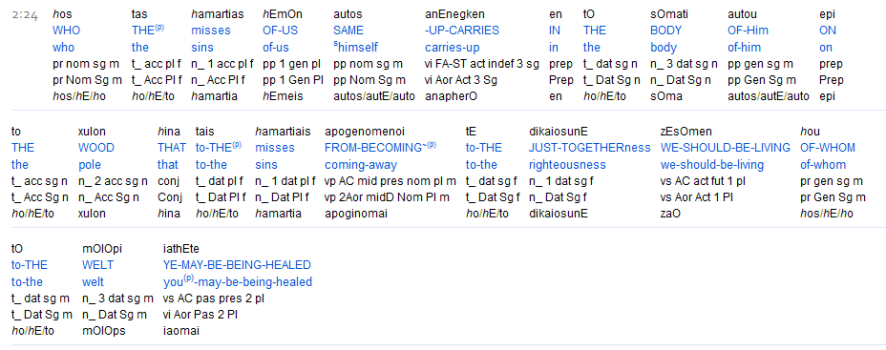If you look carefully at the Greek you will find in your two examples that the word sacrifice and offering are not in the original writings and have been added. There are Greek words for sacrifice and offering and they do not appear in the originals.
The Word sacrifice is "thysia" and offering is "prosphora" and they do not appear in any greek manuscript
Incorrect.
Examples from the New Testament:
Hebrews 10:5 (Greek text):
"Sacrifice" (θυσία, thysia) does indeed appear here:
Greek (NA28): "διό, εἰσερχόμενος εἰς τὸν κόσμον, λέγει· θυσίαν καὶ προσφορὰν οὐκ ἠθέλησας, σῶμα δὲ κατηρτίσω μοι·"
Translation (NKJV): "Therefore, when He came into the world, He said: 'Sacrifice and offering You did not desire, but a body You have prepared for Me.'"
Here, θυσία (sacrifice) and προσφορά (offering) are both present in the original Greek.
Hebrews 10:10 (Greek text):
"Offering" (προσφορά, prosphora) appears:
Greek (NA28): "ἐν ᾧ θελήματι ἡγιασμένοι ἐσμὲν διὰ τῆς προσφορᾶς τοῦ σώματος Ἰησοῦ Χριστοῦ ἐφάπαξ."
Translation (NKJV): "By that will we have been sanctified through the offering of the body of Jesus Christ once for all."
These terms, θυσία (thysia) and προσφορά (prosphora),
are genuine Greek words that are indeed found in Greek manuscripts, particularly in Hebrews, and are not later additions.
Your claim that these words do not appear in Greek manuscripts is incorrect. Both terms are used explicitly in the Greek text of the New Testament, particularly in Hebrews, referring to Jesus' sacrifice and offering.
Ephesians 5:2
Greek: καὶ περιπατεῖτε ἐν ἀγάπῃ, καθὼς καὶ ὁ Χριστὸς ἠγάπησεν ἡμᾶς καὶ παρέδωκεν ἑαυτὸν ὑπὲρ ἡμῶν προσφορὰν καὶ θυσίαν τῷ Θεῷ εἰς ὀσμὴν εὐωδίας.
Translation (NKJV): "And walk in love, as Christ also has loved us and given Himself for us, an offering and a sacrifice to God for a sweet-smelling aroma."
In this verse, both προσφορά (prosphora) and θυσία (thysia) are used to describe Christ's offering of Himself.
2. Philippians 4:18
Greek: Πάντα δέχομαι καὶ περισσεύω· πεπλήρωμαι δεξάμενος παρὰ Ἐπαφροδίτου τὰ παρ' ὑμῶν, ὀσμὴν εὐωδίας, θυσίαν δεκτὴν, εὐάρεστον τῷ Θεῷ.
Translation (NKJV): "Indeed I have all and abound. I am full, having received from Epaphroditus the things sent from you, a sweet-smelling aroma, an acceptable sacrifice, well pleasing to God."
The term θυσία (thysia) here refers to the Philippians' financial support as a sacrifice offered to God.
3. Romans 12:1
Greek: Παρακαλῶ οὖν ὑμᾶς, ἀδελφοί, διὰ τῶν οἰκτιρμῶν τοῦ Θεοῦ, παραστῆσαι τὰ σώματα ὑμῶν θυσίαν ζῶσαν, ἁγίαν, εὐάρεστον τῷ Θεῷ, τὴν λογικὴν λατρείαν ὑμῶν·
Translation (NKJV): "I beseech you therefore, brethren, by the mercies of God, that you present your bodies a living sacrifice, holy, acceptable to God, which is your reasonable service."
θυσία (thysia) here refers to the sacrifice of one's own life to God's service.
4. Hebrews 9:26
Greek: ἐπεὶ ἔδει αὐτὸν πολλάκις παθεῖν ἀπὸ καταβολῆς κόσμου· νυνὶ δὲ ἅπαξ ἐπὶ συντελείᾳ τῶν αἰώνων εἰς ἀθέτησιν τῆς ἁμαρτίας διὰ τῆς θυσίας αὐτοῦ πεφανέρωται.
Translation (NKJV): "He then would have had to suffer often since the foundation of the world; but now, once at the end of the ages, He has appeared to put away sin by the sacrifice of Himself."
θυσία (thysia) is used again, referring to Jesus' sacrifice for the removal of sin.
5. Hebrews 9:14
Greek: πόσῳ μᾶλλον τὸ αἷμα τοῦ Χριστοῦ, ὃς διὰ πνεύματος αἰωνίου ἑαυτὸν προσήνεγκεν ἄμωμον τῷ Θεῷ, καθαριεῖ τὴν συνείδησιν ὑμῶν ἀπὸ νεκρῶν ἔργων εἰς τὸ λατρεύειν Θεῷ ζῶντι.
Translation (NKJV): "How much more shall the blood of Christ, who through the eternal Spirit offered Himself without spot to God, cleanse your conscience from dead works to serve the living God?"
Here, προσφορά (prosphora) is implied in offered Himself as Christ’s offering.
Summary of Key Words:
θυσία (thysia): Appears in multiple New Testament contexts related to sacrifice, both in terms of Christ’s sacrifice and the spiritual sacrifices of believers.
προσφορά (prosphora): Used to denote offering, including Christ’s offering of Himself.
These words are well-attested in the Greek manuscripts of the New Testament, and contrary to your initial claim, they are not later additions but part of the original texts.
J.


